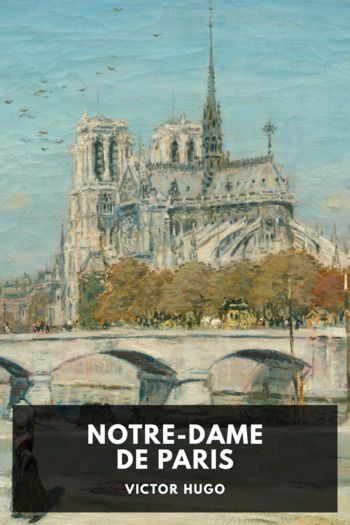Notre-Dame de Paris - Victor Hugo (diy ebook reader .txt) 📗

- Author: Victor Hugo
Book online «Notre-Dame de Paris - Victor Hugo (diy ebook reader .txt) 📗». Author Victor Hugo
What put the “whole population of Paris in commotion,” as Jehan de Troyes expresses it, on the sixth of January, was the double solemnity, united from time immemorial, of the Epiphany and the Feast of Fools.
On that day, there was to be a bonfire on the Place de Grève, a maypole at the Chapelle de Braque, and a mystery at the Palais de Justice. It had been cried, to the sound of the trumpet, the preceding evening at all the cross roads, by the provost’s men, clad in handsome, short, sleeveless coats of violet camelot, with large white crosses upon their breasts.
So the crowd of citizens, male and female, having closed their houses and shops, thronged from every direction, at early morn, towards some one of the three spots designated.
Each had made his choice; one, the bonfire; another, the maypole; another, the mystery play. It must be stated, in honor of the good sense of the loungers of Paris, that the greater part of this crowd directed their steps towards the bonfire, which was quite in season, or towards the mystery play, which was to be presented in the grand hall of the Palais de Justice (the courts of law), which was well roofed and walled; and that the curious left the poor, scantily flowered maypole to shiver all alone beneath the sky of January, in the cemetery of the Chapel of Braque.
The populace thronged the avenues of the law courts in particular, because they knew that the Flemish ambassadors, who had arrived two days previously, intended to be present at the representation of the mystery, and at the election of the Pope of the Fools, which was also to take place in the grand hall.
It was no easy matter on that day, to force one’s way into that grand hall, although it was then reputed to be the largest covered enclosure in the world (it is true that Sauval had not yet measured the grand hall of the Château of Montargis). The palace place, encumbered with people, offered to the curious gazers at the windows the aspect of a sea; into which five or six streets, like so many mouths of rivers, discharged every moment fresh floods of heads. The waves of this crowd, augmented incessantly, dashed against the angles of the houses which projected here and there, like so many promontories, into the irregular basin of the place. In the centre of the lofty Gothic1 façade of the palace, the grand staircase, incessantly ascended and descended by a double current, which, after parting on the intermediate landing-place, flowed in broad waves along its lateral slopes—the grand staircase, I say, trickled incessantly into the place, like a cascade into a lake. The cries, the laughter, the trampling of those thousands of feet, produced a great noise and a great clamor. From time to time, this noise and clamor redoubled; the current which drove the crowd towards the grand staircase flowed backwards, became troubled, formed whirlpools. This was produced by the buffet of an archer, or the horse of one of the provost’s sergeants, which kicked to restore order; an admirable tradition which the provostship has bequeathed to the constablery, the constablery to the maréchaussée, the maréchaussée to our gendarmeri of Paris.
Thousands of good, calm, bourgeois faces thronged the windows, the doors, the dormer windows, the roofs, gazing at the palace, gazing at the populace, and asking nothing more; for many Parisians content themselves with the spectacle of the spectators, and a wall behind which something is going on becomes at once, for us, a very curious thing indeed.
If it could be granted to us, the men of 1830, to mingle in thought with those Parisians of the fifteenth century, and to enter with them, jostled, elbowed, pulled about, into that immense hall of the palace, which was so cramped on that sixth of January, 1482, the spectacle would not be devoid of either interest or charm, and we should have about us only things that were so old that they would seem new.
With the reader’s consent, we will endeavor to retrace in thought, the impression which he would have experienced in company with us on crossing the threshold of that grand hall, in the midst of that tumultuous crowd in surcoats, short, sleeveless jackets, and doublets.
And, first of all, there is a buzzing in the ears, a dazzlement in the eyes. Above our heads is a double ogive vault, panelled with wood carving, painted azure, and sown with golden fleurs-de-lis; beneath our feet a pavement of black and white marble, alternating. A few paces distant, an enormous pillar, then another, then another; seven pillars in all, down the length of the hall, sustaining the spring of the arches of the double





Comments (0)